21世纪英语演讲比赛
- 格式:docx
- 大小:22.35 KB
- 文档页数:8
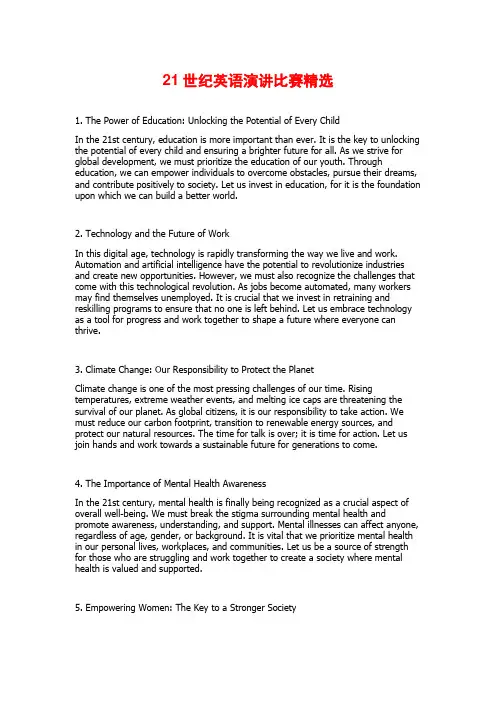
21世纪英语演讲比赛精选1. The Power of Education: Unlocking the Potential of Every ChildIn the 21st century, education is more important than ever. It is the key to unlocking the potential of every child and ensuring a brighter future for all. As we strive for global development, we must prioritize the education of our youth. Through education, we can empower individuals to overcome obstacles, pursue their dreams, and contribute positively to society. Let us invest in education, for it is the foundation upon which we can build a better world.2. Technology and the Future of WorkIn this digital age, technology is rapidly transforming the way we live and work. Automation and artificial intelligence have the potential to revolutionize industries and create new opportunities. However, we must also recognize the challenges that come with this technological revolution. As jobs become automated, many workers may find themselves unemployed. It is crucial that we invest in retraining and reskilling programs to ensure that no one is left behind. Let us embrace technology as a tool for progress and work together to shape a future where everyone can thrive.3. Climate Change: Our Responsibility to Protect the PlanetClimate change is one of the most pressing challenges of our time. Rising temperatures, extreme weather events, and melting ice caps are threatening the survival of our planet. As global citizens, it is our responsibility to take action. We must reduce our carbon footprint, transition to renewable energy sources, and protect our natural resources. The time for talk is over; it is time for action. Let us join hands and work towards a sustainable future for generations to come.4. The Importance of Mental Health AwarenessIn the 21st century, mental health is finally being recognized as a crucial aspect of overall well-being. We must break the stigma surrounding mental health and promote awareness, understanding, and support. Mental illnesses can affect anyone, regardless of age, gender, or background. It is vital that we prioritize mental health in our personal lives, workplaces, and communities. Let us be a source of strength for those who are struggling and work together to create a society where mental health is valued and supported.5. Empowering Women: The Key to a Stronger SocietyGender equality is not just a women's issue; it is a human rights issue. In the 21st century, we must strive for a society where gender does not determine one's opportunities or worth. Empowering women is not only the right thing to do; it is also the smart thing to do. Studies have shown that societies that invest in women's education and empowerment are more prosperous and peaceful. Let us break down the barriers that hold women back and create a world where everyone can achieve their full potential, regardless of their gender.。
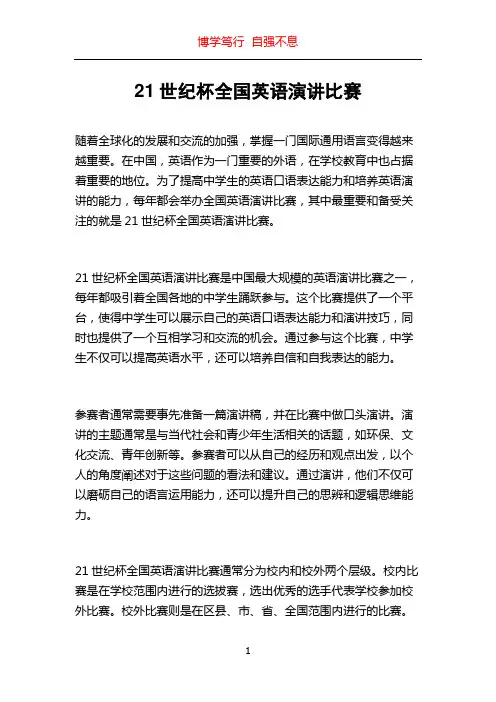
21世纪杯全国英语演讲比赛随着全球化的发展和交流的加强,掌握一门国际通用语言变得越来越重要。
在中国,英语作为一门重要的外语,在学校教育中也占据着重要的地位。
为了提高中学生的英语口语表达能力和培养英语演讲的能力,每年都会举办全国英语演讲比赛,其中最重要和备受关注的就是21世纪杯全国英语演讲比赛。
21世纪杯全国英语演讲比赛是中国最大规模的英语演讲比赛之一,每年都吸引着全国各地的中学生踊跃参与。
这个比赛提供了一个平台,使得中学生可以展示自己的英语口语表达能力和演讲技巧,同时也提供了一个互相学习和交流的机会。
通过参与这个比赛,中学生不仅可以提高英语水平,还可以培养自信和自我表达的能力。
参赛者通常需要事先准备一篇演讲稿,并在比赛中做口头演讲。
演讲的主题通常是与当代社会和青少年生活相关的话题,如环保、文化交流、青年创新等。
参赛者可以从自己的经历和观点出发,以个人的角度阐述对于这些问题的看法和建议。
通过演讲,他们不仅可以磨砺自己的语言运用能力,还可以提升自己的思辨和逻辑思维能力。
21世纪杯全国英语演讲比赛通常分为校内和校外两个层级。
校内比赛是在学校范围内进行的选拔赛,选出优秀的选手代表学校参加校外比赛。
校外比赛则是在区县、市、省、全国范围内进行的比赛。
校内比赛通常由学校教师担任评委,而校外比赛则由行业专家、教育工作者和有关英语专业人士组成的评委组进行评判。
这个比赛的评分标准主要包括内容、语言表达和演讲技巧。
内容方面,评委会看重演讲稿的观点和论据,以及参赛者对于选题的深度理解和个人见解。
语言表达方面,评委会关注参赛者的词汇量和语法运用的准确性,以及流利程度和清晰度。
演讲技巧方面,评委会会考察参赛者的语音语调、手势运用和演讲时的自信度。
通过参加21世纪杯全国英语演讲比赛,中学生可以获得多方面的益处。
首先,他们可以提高自己的英语水平。
在准备演讲稿和演讲过程中,他们需要深入研究选题并做大量的英语阅读和写作训练,从而扩大自己的词汇量和语法知识。
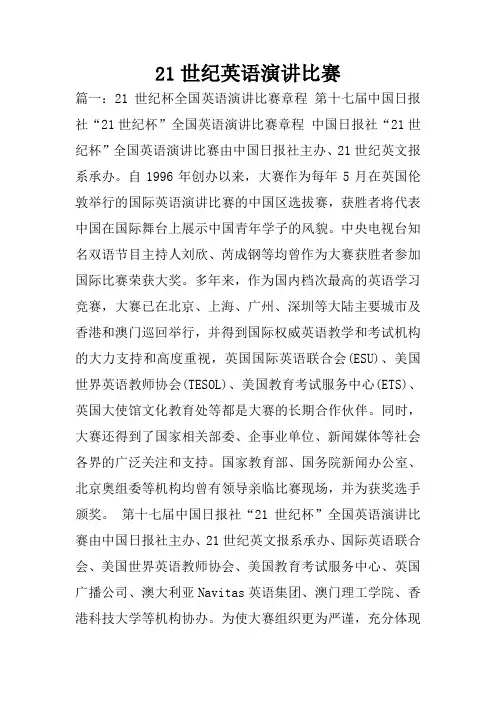
21世纪英语演讲比赛篇一:21世纪杯全国英语演讲比赛章程第十七届中国日报社“21世纪杯”全国英语演讲比赛章程中国日报社“21世纪杯”全国英语演讲比赛由中国日报社主办、21世纪英文报系承办。
自1996年创办以来,大赛作为每年5月在英国伦敦举行的国际英语演讲比赛的中国区选拔赛,获胜者将代表中国在国际舞台上展示中国青年学子的风貌。
中央电视台知名双语节目主持人刘欣、芮成钢等均曾作为大赛获胜者参加国际比赛荣获大奖。
多年来,作为国内档次最高的英语学习竞赛,大赛已在北京、上海、广州、深圳等大陆主要城市及香港和澳门巡回举行,并得到国际权威英语教学和考试机构的大力支持和高度重视,英国国际英语联合会(ESU)、美国世界英语教师协会(TESOL)、美国教育考试服务中心(ETS)、英国大使馆文化教育处等都是大赛的长期合作伙伴。
同时,大赛还得到了国家相关部委、企事业单位、新闻媒体等社会各界的广泛关注和支持。
国家教育部、国务院新闻办公室、北京奥组委等机构均曾有领导亲临比赛现场,并为获奖选手颁奖。
第十七届中国日报社“21世纪杯”全国英语演讲比赛由中国日报社主办、21世纪英文报系承办、国际英语联合会、美国世界英语教师协会、美国教育考试服务中心、英国广播公司、澳大利亚Navitas英语集团、澳门理工学院、香港科技大学等机构协办。
为使大赛组织更为严谨,充分体现学术要求,保证赛事公平、公正、公开的原则,本届大赛将分别成立“组织委员会”及“评审委员会”,分别负责赛事的组织工作和评判工作,详细委员名单将于官网公布。
本届赛事将于2011年6月28日启动,面向全国高校本、专科在校学生举行。
比赛赛区划分如下:京津赛区、河北赛区、山西赛区、浙江赛区、上海赛区、川渝赛区、辽宁赛区、吉林赛区、黑龙江赛区、陕西赛区、福建赛区、广东赛区、广西赛区、湖南赛区、湖北赛区、河南赛区、山东赛区、江苏赛区、其他赛区(含除上述地区外的中国大陆所有其他省/直辖市/自治区)。
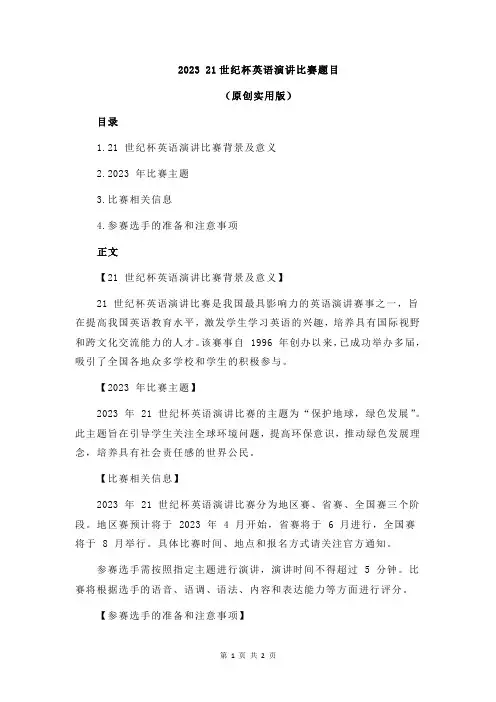
2023 21世纪杯英语演讲比赛题目(原创实用版)目录1.21 世纪杯英语演讲比赛背景及意义2.2023 年比赛主题3.比赛相关信息4.参赛选手的准备和注意事项正文【21 世纪杯英语演讲比赛背景及意义】21 世纪杯英语演讲比赛是我国最具影响力的英语演讲赛事之一,旨在提高我国英语教育水平,激发学生学习英语的兴趣,培养具有国际视野和跨文化交流能力的人才。
该赛事自 1996 年创办以来,已成功举办多届,吸引了全国各地众多学校和学生的积极参与。
【2023 年比赛主题】2023 年 21 世纪杯英语演讲比赛的主题为“保护地球,绿色发展”。
此主题旨在引导学生关注全球环境问题,提高环保意识,推动绿色发展理念,培养具有社会责任感的世界公民。
【比赛相关信息】2023 年 21 世纪杯英语演讲比赛分为地区赛、省赛、全国赛三个阶段。
地区赛预计将于 2023 年 4 月开始,省赛将于 6 月进行,全国赛将于 8 月举行。
具体比赛时间、地点和报名方式请关注官方通知。
参赛选手需按照指定主题进行演讲,演讲时间不得超过 5 分钟。
比赛将根据选手的语音、语调、语法、内容和表达能力等方面进行评分。
【参赛选手的准备和注意事项】1.深入研究主题:选手需对主题进行深入研究,确保演讲内容充实、有深度,避免空洞无物。
2.练习口语表达:选手需多加练习,提高口语表达能力,确保演讲流畅自然。
3.注意演讲技巧:演讲过程中,选手要注意语速适中,表达清晰,同时注重与观众互动,增强演讲效果。
4.提前准备:选手需提前做好准备工作,确保比赛当天能够顺利进行。
总之,2023 年 21 世纪杯英语演讲比赛将为广大学生提供一个展示自己英语水平和演讲能力的舞台。
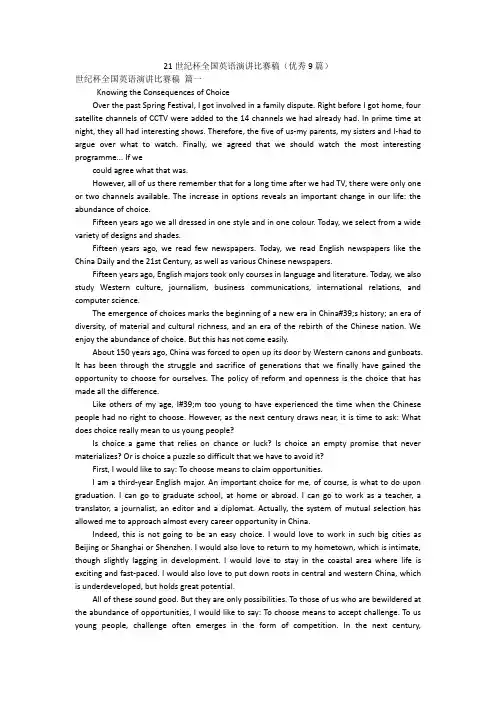
21世纪杯全国英语演讲比赛稿(优秀9篇)世纪杯全国英语演讲比赛稿篇一Knowing the Consequences of ChoiceOver the past Spring Festival, I got involved in a family dispute. Right before I got home, four satellite channels of CCTV were added to the 14 channels we had already had. In prime time at night, they all had interesting shows. Therefore, the five of us-my parents, my sisters and I-had to argue over what to watch. Finally, we agreed that we should watch the most interesting programme... If wecould agree what that was.However, all of us there remember that for a long time after we had TV, there were only one or two channels available. The increase in options reveals an important change in our life: the abundance of choice.Fifteen years ago we all dressed in one style and in one colour. Today, we select from a wide variety of designs and shades.Fifteen years ago, we read few newspapers. Today, we read English newspapers like the China Daily and the 21st Century, as well as various Chinese newspapers.Fifteen years ago, English majors took only courses in language and literature. Today, we also study Western culture, journalism, business communications, international relations, and computer science.The emergence of choices marks the beginning of a new era in China#39;s history; an era of diversity, of material and cultural richness, and an era of the rebirth of the Chinese nation. We enjoy the abundance of choice. But this has not come easily.About 150 years ago, China was forced to open up its door by Western canons and gunboats. It has been through the struggle and sacrifice of generations that we finally have gained the opportunity to choose for ourselves. The policy of reform and openness is the choice that has made all the difference.Like others of my age, I#39;m too young to have experienced the time when the Chinese people had no right to choose. However, as the next century draws near, it is time to ask: What does choice really mean to us young people?Is choice a game that relies on chance or luck? Is choice an empty promise that never materializes? Or is choice a puzzle so difficult that we have to avoid it?First, I would like to say: To choose means to claim opportunities.I am a third-year English major. An important choice for me, of course, is what to do upon graduation. I can go to graduate school, at home or abroad. I can go to work as a teacher, a translator, a journalist, an editor and a diplomat. Actually, the system of mutual selection has allowed me to approach almost every career opportunity in China.Indeed, this is not going to be an easy choice. I would love to work in such big cities as Beijing or Shanghai or Shenzhen. I would also love to return to my hometown, which is intimate, though slightly lagging in development. I would love to stay in the coastal area where life is exciting and fast-paced. I would also love to put down roots in central and western China, which is underdeveloped, but holds great potential.All of these sound good. But they are only possibilities. To those of us who are bewildered at the abundance of opportunities, I would like to say: To choose means to accept challenge. To us young people, challenge often emerges in the form of competition. In the next century,competition will not only come from other college graduates, but also from people of all ages and of all origins.With increasing international exchanges, we have to face growing competition from the whole outside world. This is calling for a higher level of our personal development.Fifteen years ago, the knowledge of a foreign language or of computer operation was considered merely an advantage. But today, with wider educational opportunities, this same knowledge has become essential to everyone.Given this situation, even our smallest choices will require great wisdom and personal determination.As we gain more initiative in choice making, the consequence of each choice also becomes more important.As we gain more initiative in choice making, the consequence of each choice also becomes more important.Nuclear power, for instance, may improve our quality of life. But it can also be used to damage the lives and possessions of millions.Economic development has enriched our lives but brought with it serious harm to our air, water and health.To those of us who are blind to the consequences of their choices, I would like to say, To choose means to take responsibility. When we are making choices for ourselves, we cannot casually say: It#39;s just my own business. As policy makers of the next century, we cannot fail to see our responsibility to those who share the earth with us.The traditional Chinese culture teaches us to study hard and work hard so as to honor our family. To me, however, this family is not just the five of us who quarreled over television programmes. Rather, it is the whole of the human family. As I am making my choices, I will not forget the smile of my teacher when I correctly spelled out the word China for the first time, I will not forget the happy faces of the boys and girls we helped to send back to school in the mountains of Jiangxi Province. I will not forget the tearful eyes of women and children in Bosnia, Chechnya and Somali, where millions are suffering from war, famine or poverty. All these people, known and unknown, make up our big human family. At different points, they came into my life and broaden my perspective. Now as I am to make choices for myself, it is time to make efforts to improve their lives, because a world will benefit us all only if every one in it can lead a peaceful and prosperous life.选择的重要性去年春节期间,我陷入过一场家庭纷争。
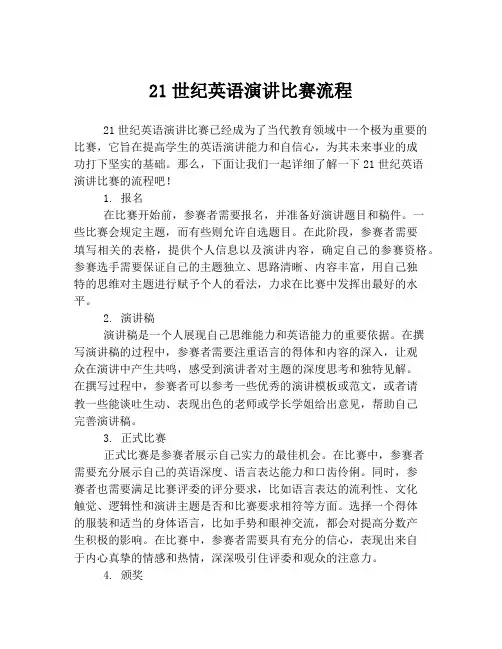
21世纪英语演讲比赛流程21世纪英语演讲比赛已经成为了当代教育领域中一个极为重要的比赛,它旨在提高学生的英语演讲能力和自信心,为其未来事业的成功打下坚实的基础。
那么,下面让我们一起详细了解一下21世纪英语演讲比赛的流程吧!1. 报名在比赛开始前,参赛者需要报名,并准备好演讲题目和稿件。
一些比赛会规定主题,而有些则允许自选题目。
在此阶段,参赛者需要填写相关的表格,提供个人信息以及演讲内容,确定自己的参赛资格。
参赛选手需要保证自己的主题独立、思路清晰、内容丰富,用自己独特的思维对主题进行赋予个人的看法,力求在比赛中发挥出最好的水平。
2. 演讲稿演讲稿是一个人展现自己思维能力和英语能力的重要依据。
在撰写演讲稿的过程中,参赛者需要注重语言的得体和内容的深入,让观众在演讲中产生共鸣,感受到演讲者对主题的深度思考和独特见解。
在撰写过程中,参赛者可以参考一些优秀的演讲模板或范文,或者请教一些能谈吐生动、表现出色的老师或学长学姐给出意见,帮助自己完善演讲稿。
3. 正式比赛正式比赛是参赛者展示自己实力的最佳机会。
在比赛中,参赛者需要充分展示自己的英语深度、语言表达能力和口齿伶俐。
同时,参赛者也需要满足比赛评委的评分要求,比如语言表达的流利性、文化触觉、逻辑性和演讲主题是否和比赛要求相符等方面。
选择一个得体的服装和适当的身体语言,比如手势和眼神交流,都会对提高分数产生积极的影响。
在比赛中,参赛者需要具有充分的信心,表现出来自于内心真挚的情感和热情,深深吸引住评委和观众的注意力。
4. 颁奖颁奖典礼是比赛的高潮部分,也是参赛选手最为关心的一部分。
在颁奖典礼上,评委会公布比赛结果,包括获胜者名单和获胜选手的得分。
获胜者将会获得一定的奖金和荣誉称号,而参赛选手也能够通过比赛收获很多知识和技能,提高英语和沟通能力。
综上所述,在21世纪英语演讲比赛中,参赛者需要在报名、演讲稿、正式比赛和颁奖等方面充分准备,做到充满自信的同时,也要尊重评委和观众的判断和评价。
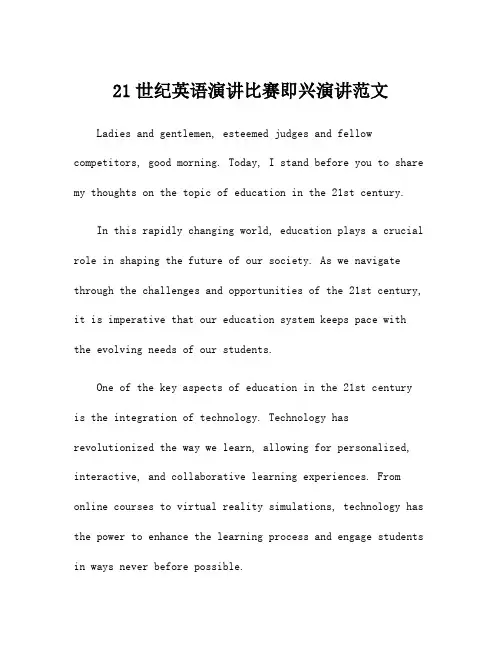
21世纪英语演讲比赛即兴演讲范文Ladies and gentlemen, esteemed judges and fellow competitors, good morning. Today, I stand before you to share my thoughts on the topic of education in the 21st century.In this rapidly changing world, education plays a crucial role in shaping the future of our society. As we navigate through the challenges and opportunities of the 21st century, it is imperative that our education system keeps pace with the evolving needs of our students.One of the key aspects of education in the 21st century is the integration of technology. Technology has revolutionized the way we learn, allowing for personalized, interactive, and collaborative learning experiences. From online courses to virtual reality simulations, technology has the power to enhance the learning process and engage students in ways never before possible.Furthermore, the 21st century demands a shift towards a more holistic and interdisciplinary approach to education. As we face complex global challenges such as climate change, poverty, and inequality, it is essential that our students are equipped with the knowledge and skills to address these issues from a multidisciplinary perspective. By breaking down the traditional silos between subjects and fostering creativity, critical thinking, and collaboration, we can prepare our students to become innovative problem solvers and global citizens.Moreover, education in the 21st century should focus on developing essential skills such as adaptability, resilience, and emotional intelligence. In a world that is increasingly volatile, uncertain, complex, and ambiguous, students need to be equipped with the skills to navigate change and uncertainty with confidence and grace. By incorporatingsocial and emotional learning into the curriculum, we canhelp students develop the resilience and empathy needed to thrive in an ever-changing world.In conclusion, education in the 21st century must adapt to the needs of our students and the demands of our rapidly changing world. By embracing technology, promoting interdisciplinary learning, and fostering essential skills, we can ensure that our students are prepared to succeed in the future. Thank you.。
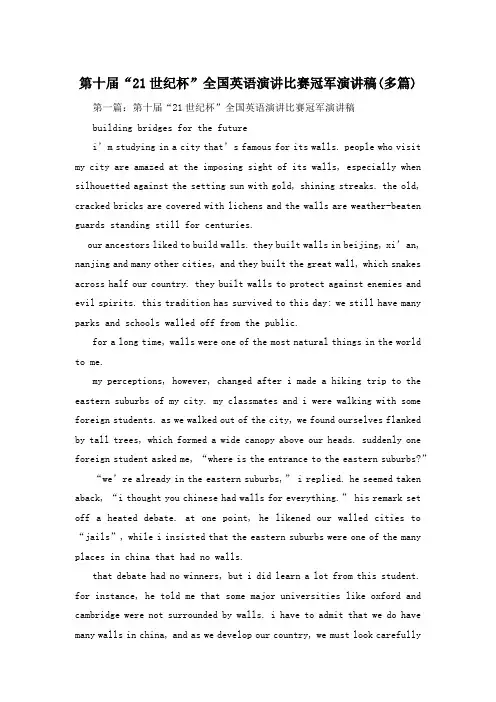
第十届“21世纪杯”全国英语演讲比赛冠军演讲稿(多篇) 第一篇:第十届“21世纪杯”全国英语演讲比赛冠军演讲稿building bridges for the futurei’m studying in a city that’s famous for its walls. people who visit my city are amazed at the imposing sight of its walls, especially when silhouetted against the setting sun with gold, shining streaks. the old, cracked bricks are covered with lichens and the walls are weather-beaten guards standing still for centuries.our ancestors liked to build walls. they built walls in beijing, xi’an, nanjing and many other cities, and they built the great wall, which snakes across half our country. they built walls to protect against enemies and evil spirits. this tradition has survived to this day: we still have many parks and schools walled off from the public.for a long time, walls were one of the most natural things in the world to me.my perceptions, however, changed after i made a hiking trip to the eastern suburbs of my city. my classmates and i were walking with some foreign students. as we walked out of the city, we found ourselves flanked by tall trees, which formed a wide canopy above our heads. suddenly one foreign student asked me, “where is the entrance to the eastern suburbs?”“we’re already in the eastern suburbs,” i replied. he seemed taken aback, “i thought you chinese had walls for everything.” his remark set off a heated debate. at one point, he likened our walled cities to “jails”, while i insisted that the eastern suburbs were one of the many places in china that had no walls.that debate had no winners, but i did learn a lot from this student. for instance, he told me that some major universities like oxford and cambridge were not surrounded by walls. i have to admit that we do have many walls in china, and as we develop our country, we must look carefullyat them and decide whether they are physical or intangible. we will keep some walls but tear down those that impede our development.let me give another example.a year ago, when i was working on a term paper, i needed a book on business law and found a copy in the law school library. however, the librarian coldly rejected my request to borrow it, saying, “you can’t borrow this book, you’re not a student here.” in the end, i had to spend 200 yuan to buy a copy. meanwhile, the copy in the law school gathered dust on the shelf.at the beginning of this semester, i heard that my university had started to think of unifying its libraries and linking them to libraries at other universities, so my experience wouldn’t be repeated. barriers would be replaced by bridges. an inter-library loan system would give us access to books from any library. with globalization and china integrated into the world, i believe many of these intangible walls will be knocked down.i know that globalization is a controversial issue, and it is hard to say whether it is good or bad. but one thing is for sure: it draws our attention to china’s tangible and intangible walls and forces us to examine their role in the modern world.and how about the ancient walls of mine and other cities? should we tear them down? definitely not. my city, like beijing and other cities, is actually making a great effort to preserve the walls. these walls attract historians, archaeologists, and many schoolchildren who are trying to study our history and cultural heritage. walls have bee bridges to our past and to the rest of the world. if the ancient builders of these walls were still alive today, they would be proud to see such great changes in the role of their walls. they are now bridges that link east and west, south and north, and all countries of the world. our cultural heritagewill survive globalization.第二篇:第十届“21世纪杯”全国英语演讲比赛冠军夏鹏演讲稿from walls to bridgesi'm studying in a city famous for its walls. all visitors to my city are amazed by the imposing sight of the city walls, silhouetted by the setting sun with gold and shining lines. with old, cracked bricks patched with lichen, the walls are weather-beaten guards, standing still for centuries in protecting the city.our ancestors liked to build walls. they built walls in beijing, xi'an, nanjing and many other cities, and they built the great wall, which snakes through half of our country. they built walls to ward off enemies and evil spirits. this tradition has been maintained to this day as we still have many parks and schools walled off from the public. i grew up at the foot of the city walls, and i've loved them since my childhood. for a long time, walls were one of the most natural things in the world.my perception, however, changed after a hiking trip to the eastern suburbs, a scenic area of my city. my classmates and i were walking with some international students. as we walked out of the city, we found ourselves flanked by taller and taller trees, which formed a huge canopy above our heads. suddenly an international student asked me, where is the entrance to the eastern suburbs?we're already in the eastern suburbs, i replied.he seemed taken aback, i thought you chinese have walls for everything. his remark set off a heated debate. at one point, he likened our walled cities to jails, while i insisted that the eastern suburbs were one of the many places in china that had no walls.that debate had no winners, but i did learn a lot from this international student. for instance, he told me that universities like oxford and cambridge were not surrounded by walls; the campuses were just part ofthe cities. i have to admit that we do have many walls in china, and as we are developing our country, we must carefully examine them, whether they are physical or intangible. we will keep some walls but tear down those that impede china's development.let me give you an example.a year ago, when i was working on a term paper, i needed a book on business law and found a copy in the law school library. however, the librarian turned down my request with a cold shoulder, saying, you can't borrow this book, you are not a student here. in the end, i had to spend 200 yuan buying a copy; meanwhile, the copy in law school was gathering dust on the shelf.at the beginning of this semester, i heard that my university has started not only to unify its libraries but also link them up with libraries of other universities, so my experience will not be repeated. barriers will be replaced by bridges. through an inter-library loan system, we will have access to books from any library. with globalization, with china integrated into the world, i believe many of these intangible walls will be knocked down.i know globalization is a controversial issue, and it is hard to say whether it is good or bad. but one thing is for sure: it draws our attention to china's tangible and intangible walls and forces us to examine their roles in the modern world.and how about the ancient walls in my city and other cities? should we tear them down? just the opposite. my city, like beijing and other cities, is actually making a great effort to preserve the walls. these walls attract not only historians and archeologists but also many schoolchildren trying to study our history and cultural heritage. walls have turned into bridges to our past and to the rest of the world. if the ancient builders of these walls were still alive today, they would be proudto see such great change in the role of their walls. they are now bridges that link east and west, south and north, and all countries of the world. our cultural heritage will survive globalization.第三篇:第十届“21世纪杯”全国英语演讲比赛冠军夏鹏演讲稿第十届“21世纪杯”全国英语演讲比赛冠军夏鹏演讲稿27信念的力量在于即使身处逆境,亦能帮助你鼓起前进的船帆;信念的魅力在于即使遇到险运,亦能召唤你鼓起生活的勇气;信念的伟大在于即使遭遇不幸,亦能促使你保持崇高的心灵。
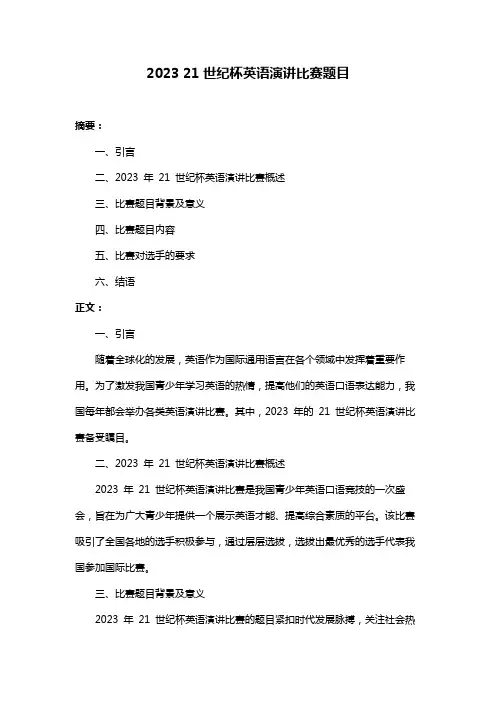
2023 21世纪杯英语演讲比赛题目摘要:一、引言二、2023 年21 世纪杯英语演讲比赛概述三、比赛题目背景及意义四、比赛题目内容五、比赛对选手的要求六、结语正文:一、引言随着全球化的发展,英语作为国际通用语言在各个领域中发挥着重要作用。
为了激发我国青少年学习英语的热情,提高他们的英语口语表达能力,我国每年都会举办各类英语演讲比赛。
其中,2023 年的21 世纪杯英语演讲比赛备受瞩目。
二、2023 年21 世纪杯英语演讲比赛概述2023 年21 世纪杯英语演讲比赛是我国青少年英语口语竞技的一次盛会,旨在为广大青少年提供一个展示英语才能、提高综合素质的平台。
该比赛吸引了全国各地的选手积极参与,通过层层选拔,选拔出最优秀的选手代表我国参加国际比赛。
三、比赛题目背景及意义2023 年21 世纪杯英语演讲比赛的题目紧扣时代发展脉搏,关注社会热点问题。
通过对题目进行深入探讨,选手们可以锻炼自己的独立思考能力、语言组织能力和口头表达能力。
同时,比赛题目也是对选手们世界观、人生观和价值观的引导,有助于他们树立正确的价值观。
四、比赛题目内容2023 年21 世纪杯英语演讲比赛的题目涉及科技、教育、环保等多个领域。
选手们需要根据自己的兴趣和专业背景,选择一个题目进行深入研究和探讨。
例如,选手可以选择人工智能技术对社会发展的影响,或者探讨绿色出行对环境保护的作用等。
五、比赛对选手的要求参加2023 年21 世纪杯英语演讲比赛的选手需要具备较高的英语口语表达能力、思维敏捷和知识面广泛。
此外,选手还需要具备较强的应变能力和心理素质,在比赛中充分展示自己的风采。
六、结语2023 年21 世纪杯英语演讲比赛为我国青少年提供了一个展示英语才能、提高综合素质的机会。
通过对比赛题目的研究和探讨,选手们可以锻炼自己的各项能力,为未来的学习和工作打下坚实基础。
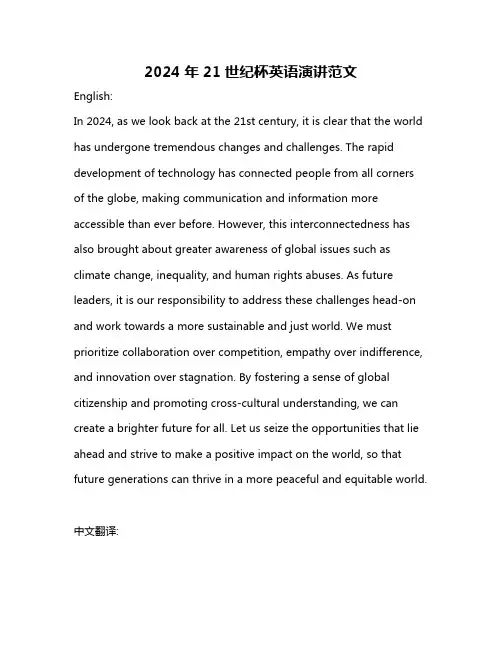
2024年21世纪杯英语演讲范文English:In 2024, as we look back at the 21st century, it is clear that the world has undergone tremendous changes and challenges. The rapid development of technology has connected people from all corners of the globe, making communication and information more accessible than ever before. However, this interconnectedness has also brought about greater awareness of global issues such as climate change, inequality, and human rights abuses. As future leaders, it is our responsibility to address these challenges head-on and work towards a more sustainable and just world. We must prioritize collaboration over competition, empathy over indifference, and innovation over stagnation. By fostering a sense of global citizenship and promoting cross-cultural understanding, we can create a brighter future for all. Let us seize the opportunities that lie ahead and strive to make a positive impact on the world, so that future generations can thrive in a more peaceful and equitable world.中文翻译:到2024年,当我们回顾21世纪时,世界已经发生了巨大的变化和挑战。
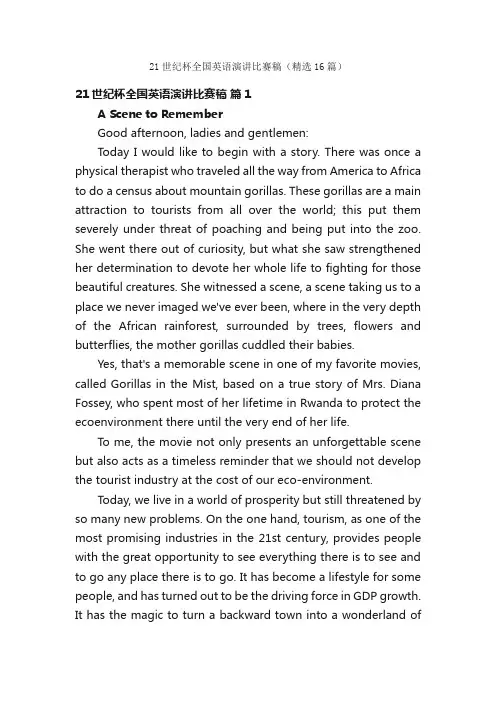
21世纪杯全国英语演讲比赛稿(精选16篇)21世纪杯全国英语演讲比赛稿篇1A Scene to RememberGood afternoon, ladies and gentlemen:Today I would like to begin with a story. There was once a physical therapist who traveled all the way from America to Africa to do a census about mountain gorillas. These gorillas are a main attraction to tourists from all over the world; this put them severely under threat of poaching and being put into the zoo. She went there out of curiosity, but what she saw strengthened her determination to devote her whole life to fighting for those beautiful creatures. She witnessed a scene, a scene taking us to a place we never imaged we've ever been, where in the very depth of the African rainforest, surrounded by trees, flowers and butterflies, the mother gorillas cuddled their babies.Yes, that's a memorable scene in one of my favorite movies, called Gorillas in the Mist, based on a true story of Mrs. Diana Fossey, who spent most of her lifetime in Rwanda to protect the ecoenvironment there until the very end of her life.To me, the movie not only presents an unforgettable scene but also acts as a timeless reminder that we should not develop the tourist industry at the cost of our eco-environment.Today, we live in a world of prosperity but still threatened by so many new problems. On the one hand, tourism, as one of the most promising industries in the 21st century, provides people with the great opportunity to see everything there is to see and to go any place there is to go. It has become a lifestyle for some people, and has turned out to be the driving force in GDP growth. It has the magic to turn a backward town into a wonderland ofprosperity. But on the other hand, many problems can occur - natural scenes aren't natural anymore. Deforestation to heat lodges are devastating Nepal. Oil spills from tourist boats are polluting Antarctica. Tribal people are forsaking their native music and dress to listen to U2 on Walkman and wear Nike and Reeboks.All these appalling facts have brought us to the realization that we can no longer stand by and do nothing, because the very thought of it has been eroding our resources. Encouragingly, the explosive growth of global travel has put tourism again in the spotlight, which is why the United Nations has made 20xx the year of ecotourism, for the first time to bring to the world's attention the benefits of tourism, but also its capacity to destroy our ecoenvironment.Now every year, many local ecoenvironmental protection organizations are receiving donations - big notes, small notes or even coins - from housewives, plumbers, ambulance drivers, salesmen, teachers, children and invalids. Some of them cannot afford to send the money but they do. These are the ones who drive the cabs, who nurse in hospitals, who are suffering from ecological damage in their neighborhood. Why? Because they care. Because they still want their Mother Nature back. Because they know it still belongs to them.This kind of feeling that I have, ladies and gentlemen, is when it feels like it, smells like it, and looks like it , it's all coming from a scene to be remembered, a scene to recall and to cherish.The other night, as I saw the moon linger over the land and before it was sent into the invisible, my mind was filled with songs.I found myself humming softly, not to the music, but to something else, someplace else, a place remembered, a placeuntouched, a field of grass where no one seemed to have been except the deer.And all those unforgettable scenes strengthened the feeling that it's time for us to do something, for our own and our coming generation.Once again, I have come to think of Mrs. Diana Fossey because it is with her spirit, passion, courage and strong sense of our ecoenvironment that we are taking our next step into the world.And no matter who we are, what we do and where we go, in our minds, there's always a scene to remember, a scene worth our effort to protect it and fight for it.Thank you very much.21世纪杯全国英语演讲比赛稿篇2Sports are more than competitions. To me, they mean growth under the care of others. I learned this the hard way.I used to be very shy and often felt lonely. Although I did well in all the academic subjects, I was afraid of physical education. My classmates often laughed at me.“Look at that girl,” they said. “Her feet don’t leave the ground when she runs!”Their words embarrassed me. Moreover, whenever the teacher organized some competitive games, no one in the class liked to have me as their partner or team member. As a result, I often ended up looking at others enjoy their games.Things would go on like that if not for a sports meet in my high school. By mistake, my name was put on the list of those who would compete in the women’s 1500 meters race. By the time people found the mistake, it was too late to change.My desk-mate was a natural athlete. She said to me, “Icouldn’t run that race in your place, because I’ve signed up for three items already.” Other athletic girls of the class said the same.I was utterly dumbfounded. 1500 meters! Running against the best runners from other classes! And in front of students of the entire school! It would be the worst nightmare I’d ev er have!“You still have time to catch up because there is still one month before the sports meet,” they all said this to me, including my teacher.My desk-mate patted me on the shoulder, “Cool! You will run for our class! And we will do training together.” Yes, this is not just for myself, but for my class too, I said to myself. But still, 1500 meters to me was like Mount Everest to a beginning climber.I had no idea even how to start my preparation.Fortunately, my desk-mate gave me a hand. Every afternoon after class, several of us ran together. When the fear of being laughed at struck me, I saw others running right beside me. They gave me strengths. While we were running, some others would stand by the tracks cheering for us.One month certainly couldn’t make me a good runner. But when I was standing behind the start line, I no longer felt lonely or afraid. I saw my classmates standing by the tracks waving at me as if about to run beside me.With the shot of the starting gun, I dashed out and ran as fast as I could, as if it were a 200-meter race. Soon I was out of breath and slowed down. Other runners passed me one by one, and gradually I had no idea how many of them were still behind me. My legs were getting heavier and heavier, and I might fall down at any moment. However, I suddenly heard my classmates chanting my name. My desk-mate even ran along the tracksbeside me and cheered for me at the same time, just like the month-long training we did together.As expected, I was almost the last to cross the finish line. Immediately, my classmates held my arms and urged me to walk on my feet and not to sit down. I was surrounded, with all kinds of drinks handed to me. I felt a kind of warmth I had never felt before. Even though I was almost the last to finish the race, I was full of confidence that I would improve in the future.That sports meet was an unforgettable experience. The memory of my classmates cheering for me, holding my arms and handing me drinks stays fresh on my mind. Sports are no longer about winning or losing. They give me a lot of confidence, both confidence in my fellow students and confidence in my own potential. I am no longer lonely, no longer afraid. Sports have brought me close to my classmates and helped us grow together.Now, I participate in the sports meet every year. Even if I am not competing, I would help my classmates with their practice, just like the way my desk-mate and others ran with me.体育比赛越来越多。
2024年“21世纪杯”全国英语演讲比赛冠军演讲稿尊敬的评委老师们,亲爱的同学们:大家好!我非常荣幸站在这里,代表我所在的学校参加2024年“21世纪杯”全国英语演讲比赛并获得冠军。
首先,我想表达我的感激之情,感谢学校为我提供了这个宝贵的机会,感谢我的家人、老师和朋友的支持和鼓励。
同时,我也要向其他参赛选手致以最真诚的祝贺,你们的演讲都非常出色。
今天,我要和大家分享的主题是“英语学习与全球交流”。
在这个信息高度发达、全球联系日益紧密的时代,英语的地位越来越重要。
英语已经成为我们与全世界沟通的桥梁,也是我们在国际舞台上竞争的利器。
首先,学习英语能够为我们拓宽视野、增长知识。
英语是世界上使用最广泛的语言之一,通过学习英语,我们能够获得更多的信息和知识,了解更多的文化和思维方式。
我们可以畅游于英语世界的海洋,与不同国家的人交流,了解他们的习俗和观念,这样我们可以更全面地认识世界,提高自己的国际视野。
其次,学习英语能够为我们打开更多的机会。
随着全球化进程的不断推进,越来越多的职位要求具备英语交流能力。
掌握英语能够为我们创造更多的就业机会,让我们更好地适应国际市场的需求。
无论是在跨国公司工作,还是在国外留学深造,英语都是我们必不可少的工具。
最重要的是,学习英语可以促进国际友谊和文化交流。
语言是人与人之间沟通的纽带,通过学习英语,我们能够与世界各地的人进行更深入的交流和了解,从而增进友谊。
学习和掌握英语,不仅是个人的需求,也是国家交流与合作的需要。
通过英语的学习,我们可以为促进世界和平与发展贡献一份力量。
然而,学习英语并不是一条易行的路。
面对课业繁重和学习压力,我们可能感到困惑和沮丧。
但是,我想告诉大家,只要我们有信心,有毅力,就一定能够克服困难,取得成功。
首先,我们应该树立正确的学习态度。
学习英语是一个长期的过程,我们必须保持耐心和坚持的精神,不怕困难,不怕挫折。
我们要相信自己的能力,相信只要努力,就一定能够学好英语。
21世纪英语演讲竞赛英语自我介绍English:Hello everyone, my name is [Your Name] and I am honored to have the opportunity to take part in the 21st Century English Speech Competition. I am currently a student majoring in English at [Your University]. Participating in this competition is not only a chance for me to showcase my English speaking ability, but also a valuable opportunity for personal growth. I have always been passionate about the English language and I believe that this competition will allow me to challenge myself and improve my communication skills. I am looking forward to sharing my thoughts and ideas on the given topic and am excited to hear the perspectives of the other participants. I believe this competition will not only help me develop my public speaking skills but also allow me to connect with other like-minded individuals and build lasting relationships. Thank you for this opportunity and I am eager to contribute my best to this competition.中文翻译:大家好,我叫[你的名字],很荣幸有机会参加21世纪英语演讲竞赛。
21世纪英语演讲比赛1.i love my motherland there is abeatiful country standing in the east of the world.she has red soil,big mountains,long rivers and hardworking people,she is just like adiamond,shinning all the time,and she is my dearest country---china!i love my motherland!because ilove the different races of my country!each race has its own culture and customs.some people are kindhearted,some people are ggenerous,some people are humourous.anyway,i can''t display evry race of my country,but what iwant to tell you is that the chinese people are great.because of them,our motherland is developing day by day.our country is becoming much stronger tham before.my country has so many great places of interest,which is known not only to every citizen,but also to the world.when the foreigners talk about china,they all extend their thums and sayen.china is afamous and fantastic country!yes,that''s ture!we have the great wall,the world''s second longest river,the oldest history and the most glorious culture.as wa all know,china is one of the largest countries in the world,when it is snowing in the north,the flowers have come out in the south,when the people in the south are enjoying the sunshine on the beach,the people in the north are skiing on the ice.how marvelous it is!so now ican speak to the world loudly my country is really great!my country is really beautiful!2.good evening ,ladies and gentlemen:晚上好,女士们,先生们:thank you very much fou choosing to come in such a cold night.today my topic is about choice and process.a research shows that a man has to make 73 choices one day.with so manychoices one day, people easily get so confused and afraid of ma-ki-ng wrong choice that they hesitate and finally mithe true part of life. in my opinion, the following part is of much more importance than the choice. there is no absolute right or wrong choice but wonderful or boring life, which the procemakes the difference.非常感谢你傅聪来选择在这样一个寒冷夜晚.今天我的话题是关于选择和process.a研究表明,一个人必须作出的选择73一一天,如此众多的选择,有一天,人们容易混淆,因此害怕作出错误的选择,他们毫不犹豫地并最终错过了真正的生活的一部分。
Title: Embracing the Future: The 21st Century English Speech ContestGood morning/afternoon, everyone,It is an honor to stand before you today to introduce the exciting and inspiring 21st Century English Speech Contest. This contest is a platform that empowers young minds to express their ideas, showcase their linguistic talents, and engage with global issues in an impactful way.The 21st Century English Speech Contest is more than just a competition; it is a celebration of eloquence, creativity, and critical thinking. Participants from various backgrounds come together to share their perspectives on a wide range of topics, from technology and innovation to environmental sustainability and cultural diversity. This contest reflects the dynamic and interconnected world we live in today.Why Participate?1.Develop Communication Skills:One of the primary benefits of this contest is the development of strongcommunication skills. Participants learn how to articulate their thoughts clearly andpersuasively, which is an invaluable asset in both personal and professional life.2.Enhance Critical Thinking:Preparing for the speech contest requires thorough research and analysis.Contestants must think critically about their chosen topics, formulate coherentarguments, and present their ideas logically. This process sharpens their analyticalabilities and broadens their understanding of global issues.3.Boost Confidence:Standing on stage and speaking in front of an audience can be a daunting experience.However, it is also a powerful way to build self-confidence. The more participantspractice and perform, the more comfortable they become with public speaking,boosting their overall self-esteem.4.Cultural Exchange:The contest attracts participants from different regions and countries, fostering arich exchange of cultures and ideas. This interaction promotes mutual understandingand respect among young people from diverse backgrounds, contributing to a moreinclusive and harmonious global community.working Opportunities:The 21st Century English Speech Contest provides an excellent opportunity tonetwork with peers, educators, and professionals. These connections can lead tovaluable friendships, collaborations, and even future career opportunities. Structure of the ContestThe contest typically consists of several rounds, including preliminary heats,semi-finals, and finals. Each round is designed to challenge participants and bring out their best. In the initial rounds, contestants deliver prepared speeches on topics provided by the organizers. As they progress, they may also face impromptu speech rounds, where they must think on their feet and respond to a topic with minimal preparation time.Judging CriteriaParticipants are evaluated based on several criteria, including content, delivery, language proficiency, and overall impact. Judges look for originality, clarity of expression, persuasive arguments, and the ability to engage and inspire the audience.ConclusionIn conclusion, the 21st Century English Speech Contest is a remarkable event that nurtures young talents, promotes intellectual growth, and encourages cultural exchange. It is a stepping stone for aspiring speakers to hone their skills and make their voices heard on a global stage.I encourage all young enthusiasts to seize this opportunity, embrace the challenge, and let your words shape the future. Whether you win or not, the experience and skills gained from participating in this contest will undoubtedly be invaluable assets in your journey ahead.Thank you, and I wish all the participants the very best in this exciting contest. Let your passion for speaking and your commitment to making a difference shine through your words.。
21世纪杯全国英语演讲比赛稿21世纪杯全国英语演讲竞赛稿1The Doors that Are Open to UsGood morning ladies and gentlemen:The title of my speech today is "The Doors that Are Open to Us ".The other day my aunt paid me a visit. She was overjoyed. "I got the highest mark in the mid-term examination!" she said. Don't be surprised! My aunt is indeed a student; to be exact, a college student at the age of 45.Last year, she put aside her private business and signed up for a one-year, full-time management course in a college. "This was the wisest decision I have ever made," she said proudly like a teenage girl. To her, college is always a right place to pick up new ideas, and new ideas always make her feel young."Compared with the late 70s," she says, "now college students have many doors." My aunt cannot help but recall her first college experience in 1978 when college doors began to be re-opened afterthe Cultural Revolution. She was assigned to study engineering despite her desire to study Chinese literature, and a few years later, the government sent her to work in a TV factory.I was shocked when she first told me how she (had) had no choice in her major and job. Look at us today! So many doors are open to us! I believe there have never been such abundant opportunities for self-development as we have today. And my aunt told me that we should reach our goals by grasping all these opportunities.The first door I see is the opportunity to study different kinds of subjects that interest us. My aunt said she was happy to study management, but she was also happy that she could attend lectures on ancient Chinese poetry and on Shakespearean drama. As for myself, I am an English major, but I may also go to lectures on history. To me, if college education in the past emphasized specialization, now, it emphasizes free and well-rounded development of each individual. So all the fine achievements of human civilization are open to us.The second door is the door to the outside world. Learning goes beyond classrooms and national boundaries. My aunt remembers her previous college days as monotonous and even calls her generation"frogs in a well." But today, as the world becomes a global village, it is important that our neighbors and we be open-minded to learn with and from each other. I have many fellow international classmates, and I am applying to an exchange program with a university abroad. As for my aunt, she is planning to get an MBA degree in the United Kingdom where her daughter, my cousin, is now doing her master's degree in biochemistry. We are now taking the opportunity to study overseas, and when we come back, we'll put to use what we have learnt abroad.The third door is the door to lifelong learning. As new ideas appear all the time, we always need to acquire new knowledge, regardless of our age. Naturally, my aunt herself is the best example. Many of my aunt's contemporaries say that she is amazingly up-to-date for a middle-aged woman. She simply responds, "Age doesn't matter. What matters is your attitude. You may think it's strange that I am still going to college, but I don't think I'm too old to learn." Yes, she is right. Since the government removed the age limit for college admissions in 20xx, there are already some untraditional students, sitting with us in the same classrooms. Like these people, my aunt is old but she is very young in spirit.With her incredible energy and determination, she embodies both tradition and modernity.The doors open to us also pose challenges. For instance, we are faced with the challenge of a balanced learning, the challenge of preserving our fine tradition while learning from the West, and the challenge of learning continuously while carrying heavy responsibilities to our work and family. So, each door is a test of our courage, ability and judgment, but with the support of my teachers, parents, friends and my aunt, I believe I can meet the challenge head on. When I reach my aunt's age, I can be proud to say that I have walked through dozens of doors and will, in the remainder of my life, walk through many more. Possibly I will go back to college, too.Thank you very much, ladies and gentlemen.21世纪杯全国英语演讲竞赛稿2From Walls to BridgesI'm studying in a city famous for its walls. All visitors to my city are amazed by the imposing sight of the city walls, silhouetted by the setting sun with gold and shining lines. With old, cracked bricks patched with lichen, the walls areweather-beaten guards, standing still for centuries in protecting the city.Our ancestors liked to build walls. They built walls in Beijing, Xi'an, Nanjing and many other cities, and they built the Great Wall, which snakes through half of our country. They built walls to ward off enemies and evil spirits. This tradition has been maintained to this day as we still have many parks and schools walled off from the public. I grew up at the foot of the city walls, and I've loved them since my childhood. For a long time, walls were one of the most natural things in the world.My perception, however, changed after a hiking trip to the Eastern Suburbs, a scenic area of my city. My classmates and I were walking with some international students. As we walked out of the city, we found ourselves flanked by taller and taller trees, which formed a huge canopy above our heads. Suddenly an international student asked me, "Where is the entrance to the Eastern Suburbs?""We're already in the Eastern Suburbs," I replied.He seemed taken aback, "I thought you Chinese have walls for everything." His remark set off a heated debate. At one point, he likened our walled cities to "jails," while I insisted that theEastern Suburbs were one of the many places in China that had no walls.That debate had no winners, but I did learn a lot from this international student. For instance, he told me that universities like Oxford and Cambridge were not surrounded by walls; the campuses were just part of the cities. I have to admit that we do have many walls in China, and as we are developing our country, we must carefully examine them, whether they are physical or intangible. We will keep some walls but tear down those that impede China's development.Let me give you an example.A year ago, when I was working on a term paper, I needed a book on business law and found a copy in the law school library. However, the librarian turned down my request with a cold shoulder, saying, "You can't borrow this book, you are not a student here." In the end, I had to spend 200 yuan buying a copy; meanwhile, the copy in law school was gathering dust on the shelf.At the beginning of this semester, I heard that my university has started not only to unify its libraries but also link them up with libraries of other universities, so my experience will not berepeated. Barriers will be replaced by bridges. Through an inter-library loan system, we will have access to books from any library. With globalization, with China integrated into the world, I believe many of these intangible walls will be knocked down.I know globalization is a controversial issue, and it is hard to say whether it is good or bad. But one thing is for sure: it draws our attention to China's tangible and intangible walls and forces us to examine their roles in the modern world.And how about the ancient walls in my city and other cities? Should we tear them down? Just the opposite. My city, like Beijing and other cities, is actually making a great effort to preserve the walls. These walls attract not only historians and archeologists but also many schoolchildren trying to study our history and cultural heritage. Walls have turned into bridges to our past and to the rest of the world. If the ancient builders of these walls were still alive today, they would be proud to see such great change in the role of their walls. They are now bridges that link East and West, South and North, and all countries of the world. Our cultural heritage will survive globalization.21世纪杯全国英语演讲竞赛稿3A Scene to RememberGood afternoon, ladies and gentlemen:Today I would like to begin with a story. There was once a physical therapist who traveled all the way from America to Africa to do a census about mountain gorillas. These gorillas are a main attraction to tourists from all over the world; this put them severely under threat of poaching and being put into the zoo. She went there out of curiosity, but what she saw strengthened her determination to devote her whole life to fighting for those beautiful creatures. She witnessed a scene, a scene taking us to a place we never imaged we've ever been, where in the very depth of the African rainforest, surrounded by trees, flowers and butterflies, the mother gorillas cuddled their babies.Yes, that's a memorable scene in one of my favorite movies, called Gorillas in the Mist, based on a true story of Mrs. Diana Fossey, who spent most of her lifetime in Rwanda to protect the ecoenvironment there until the very end of her life.To me, the movie not only presents an unforgettable scene but also acts as a timeless reminder that we should not develop the tourist industry at the cost of our eco-environment.Today, we live in a world of prosperity but still threatenedby so many new problems. On the one hand, tourism, as one of the most promising industries in the 21st century, provides people with the great opportunity to see everything there is to see and to go any place there is to go. It has become a lifestyle for some people, and has turned out to be the driving force in GDP growth. It has the magic to turn a backward town into a wonderland of prosperity. But on the other hand, many problems can occur - natural scenes aren't natural anymore. Deforestation to heat lodges are devastating Nepal. Oil spills from tourist boats are polluting Antarctica. Tribal people are forsaking their native music and dress to listen to U2 on Walkman and wear Nike and Reeboks.All these appalling facts have brought us to the realization that we can no longer stand by and do nothing, because the very thought of it has been eroding our resources. Encouragingly, the explosive growth of global travel has put tourism again in the spotlight, which is why the United Nations has made 20xx the year of ecotourism, for the first time to bring to the world's attention the benefits of tourism, but also its capacity to destroy our ecoenvironment.Now every year, many local ecoenvironmental protectionorganizations are receiving donations - big notes, small notes or even coins - from housewives, plumbers, ambulance drivers, salesmen, teachers, children and invalids. Some of them cannot afford to send the money but they do. These are the ones who drive the cabs, who nurse in hospitals, who are suffering from ecological damage in their neighborhood. Why? Because they care. Because they still want their Mother Nature back. Because they know it still belongs to them.This kind of feeling that I have, ladies and gentlemen, is when it feels like it, smells like it, and looks like it , it's all coming from a scene to be remembered, a scene to recall and to cherish.The other night, as I saw the moon linger over the land and before it was sent into the invisible, my mind was filled with songs.I found myself humming softly, not to the music, but to something else, someplace else, a place remembered, a place untouched, a field of grass where no one seemed to have been except the deer.And all those unforgettable scenes strengthened the feeling that it's time for us to do something, for our own and our coming generation.Once again, I have come to think of Mrs. Diana Fossey because it is with her spirit, passion, courage and strong sense of ourecoenvironment that we are taking our next step into the world.And no matter who we are, what we do and where we go, in our minds, there's always a scene to remember, a scene worth our effort to protect it and fight for it.Thank you very much.。
21世纪杯学生比赛英语演讲稿范文(精选17篇)21世纪杯学生比赛英语篇1Me and my FearsHonorable judges, distinguished guests, ladies and gentlemen:It is a great honor and pleasure to be here on this beautiful Saturday morning to share with you my sentiments about life and passion for the English language.About a year and a half ago, I took part in my very first English Speech Contest. When I stood before the microphone with all eyes starring directly at me, I could hardly speak. I stood there, embarrassed and helpless, struggling in vain for the right thing to say. My fears had paralyzed me.While my passion for English has never changed, I lost my courage to speak in public. When my professor again encouraged me to take part in this Competition, I said “no.” I couldn’t endure yet another painful experience. He looked me straight in the eye and said something that pierced my heart. I will never forget his words. “Look,” he said, “We all have our fears, and you have yours. You could twist your ankle in a basketball game, but then be afraid to ever play again. Running away can never dispel your fears, but action will. A winner is not one who never fails,but one who never quits.”I spent a whole day with his words twisting and turning in my mind. Then I made the bravest and wisest decision of my life: I would face my fears – and take part in the competition!As it turned out, my dear old professor was right. Now, here I am, once again standing before a microphone. My heart is beating fast, and my mouth is dry, but most importantly, I havefaced my fears -- and that makes all the difference!Thank you.战胜恐惧尊敬的评委,各位来宾,女士们先生们,我很荣幸在这个美妙的星期六早上来到这里,与你们分享我生命中一段特别的经历。
21世纪英语演讲比赛1.I ove my motherand There is abeatifu country standing in the east of the word.She has red soi,big mountains,ong rivers and hardworking peope,she is just ike adiamond,shinning a the time,and she is my dearest country---China!I ove my motherand!Because Iove the different races of my country!Each race has its own cuture and customs.Some peope are kindhearted,some peope are ggenerous,some peope are humourous.anyway,I cant dispay evry race of my country,but what Iwant to te you is that the Chinese peope are great.Because of them,our motherand is deveoping day by day.Our country is becoming much stronger tham before. My country has so many great paces ofinterest,which is known not ony to every citizen,but aso to the word.When the foreigners tak about China,they a extend their thums and sayEn.China is afamous and fantastic country!Yes,thats ture!We have the Great Wa,the words second ongest river,the odest history and the most gorious cuture.As wa aknow,China is one of the argest countries in the word,when it is snowing in the north,the fowers have come out in the south,when the peope in the south are enjoying the sunshine on the beach,the peope in the north are skiing on the ice.How marveous it is!So now Ican speak to the word oudy My country is reay great!My country is reay beautifu!2.Good evening ,Ladies and Gentemen:晚上好,女士们,先生们:Thank you very much fou choosing to come in such a cod night.Today my topic is about choice and process.A research shows that a man has to make 73 choices one day.With so many choices one day, peope easiy get so confused and afraid of ma-ki-ng wrong choice that they hesitate and finay mithe true part of ife. In my opinion, the foowing part is of much more importance than the choice. There is no absoute right or wrong choice but wonderfu or boring ife, which the procemakes the difference.非常感谢你傅聪来选择在这样一个寒冷夜晚.今天我的话题是关于选择和process.A研究表明,一个人必须作出的选择73一一天,如此众多的选择,有一天,人们容易混淆,因此害怕作出错误的选择,他们毫不犹豫地并最终错过了真正的生活的一部分。
在我看来,下面的部分是更重要的不是选择。
没有绝对的对错选择,但精彩或乏味的生活,这使得该进程的差异。
演讲稿又叫演说词,它是在大会上或其他公开场合发表个人的观点、见解和主张的文稿。
演讲稿的好坏直接决定了演讲的成功与失败。
演讲稿像议论文一样论点鲜明、逻辑性强,但它又不是一般的管理资料下载网议论文。
它是一种带有宣传性和鼓动性的应用文体,经常使用各种修辞手法和艺术手法,具有较强的感染力。
演讲未必都使用演讲稿,不少著名的演讲都是即兴之作,由别人经过记录流传开来的。
但重要的演讲最好还是事先准备好演讲稿,因为演讲稿至少有两个方面的作用:其一,通过对思路的精心梳理,对材料的精心组织,使演讲内容更加深刻和富有条理。
其二,可帮助演讲者消除临场紧张、恐惧的心理,增强演讲者的自信心。
演讲稿特点主要区别演讲和表演、作文有很大的区别。
首先,演讲是演讲者就人们普遍关注的某种有意义的事物或问题,通过口头语言面对一定场合的听众,直接发表意见的一种社会活动。
其次,作文是作者通过文章向读者单方面的输出信息,演讲则是演讲者在现场与听众双向交流信息。
严格地讲,演讲是演讲者与听众、听众与听众的三角信息交流,演讲者不能以传达自己的思想和情感、情绪为满足,他必须能控制住自己与听众、听众与听众情绪的应和与交流。
所以,为演讲准备的稿子就具有以下三个特点:主要特点第一、针对性。
演讲是一种社会活动,是用于公众场合的宣传形式。
它为了以思想、感情、事例和理论来晓喻听众,打动听众,征服群众,必须要有现实的针对性。
所谓针对性,首先是作者提出的问题是听众所关心的问题,评论和论辨要有雄辩的逻辑力量,要能为听众所接受并心悦诚服,这样,才能起到应有的社会效果;其次是要懂得听众有不同的对象和不同的层次,而公众场合也有不同的类型,如党团集会、专业性会议、服务性俱乐部、学找范文就来 wwW.downh ot .c o m校、社会团体、宗教团体、各类竞赛场合,写作时要根据不同场合和不同对象,为听众设计不同的演讲内容。
第二、可讲性。
演讲的本质在于讲,而不在于演,它以讲为主、以演为辅。
由于演讲要诉诸口头,拟稿时必须以易说能讲为前提。
如果说,有些文章和作品主要通过阅读欣赏,领略其中意义和情味,那么,演讲稿的要求则是上口入耳。
一篇好的演讲稿对演讲者来说要可讲;对听讲者来说应好听。
因此,演讲稿写成之后,作者最好能通过试讲或默念加以检查,凡是讲不顺口或听不清楚之处(如句子过长),均应修改与调整。
第三、鼓动性。
演讲是一门艺术。
好的演讲自有一种激发听众情绪、赢得好感的鼓动性。
要做到这一点,首先要依靠演讲稿思想内容的丰富、深刻,见解精辟,有独到之处,发人深思,语言表达要形象、生动,富有感染力。
如果演讲稿写得平淡无味,毫无新意,即使在现场演得再卖力,效果也不会好,甚至相反。
第四、整体性演讲稿并不能独立地完成演讲任务,它只是演讲的一个文字依据,是整个演讲活动的一个组成部分。
演讲主体、听众对象、特定的时空条件,共同构成了演讲活动的整体。
撰写演讲稿时,不能将它从整体中剥离出来。
为此,演讲稿的撰写要注意以下几个方面:首先,要根据听众的文化层次、工作性质、生存环境、品位修养、爱好愿望来确立选题,选择表达方式,以便更好地沟通。
其次,演讲稿不仅要充分体现演讲者独到、深刻的观点和见解,而且还要对声调的高低、语速的快慢、体态语的运用进行设计并加以注释,以达到最佳的传播效果。
另外,还要考虑演讲的时间、空间、现场氛围等因素,以强化演讲的现场效果。
第五、口语性口语性是演讲稿区别于其他书面表达文章和会议文书的重要方面。
书面性文章无需多说,其他会议文书如大会工作报告、领导讲话稿等,并不太讲究口语性,虽然由某一领导在台上宣读,但听众手中一般也有一份印制好的讲稿,一边听讲一边阅读,不会有什么听不明白的地方。
演讲稿就不同了,它有较多的即兴发挥,不可能事先印好讲稿发给听众。
为此,演讲稿必须讲究上口和入耳。
所谓上口,就是讲起来通达流利。
所谓入耳,就是听起来非常顺畅,没有什么语言障碍,不会发生曲解。
具体要做到:把长句改成适听的短句;把倒装句改为常规句;把听不明白的文言词语、成语加以改换或删去;把单音节词换成双音节词;把生僻的词换成常用的词;把容易误听的词换成不易误听的词。
这样,才能保证讲起来朗朗上口,听起来清楚明白。
第六、临场性演讲活动是演讲者与听众面对面的一种交流和沟通。
听众会对演讲内容及时作出反应:或表示赞同,或表示反对,或饶有兴趣,或无动于衷。
演讲者对听众的各种反映不能置之不顾,因此,写演讲稿时,要充分考虑它的临场性,在保证内容完整的前提下,要注意留有伸缩的余地。
要充分考虑到演讲时可能出现的种种问题,以及应付各种情况的对策。
总之,演讲稿要具有弹性,要体现出必要的控场技巧。
主要功能第一、使人知演讲。
这是一种以传达信息、阐明事理为主要功能的演讲。
它的目的在于使人知道、明白。
如美学家朱光潜的演讲《谈作文》,讲了作文前的准备、文章体裁、构思、选材等,使听众明白了作文的基本知识。
它的特点是知识性强,语言准确。
第二、使人信演讲。
这种演讲的主要目的是使人信赖、相信。
它从使人知演讲发展而来。
如恽代英的演讲《怎样才是好人》,不仅告知人们哪些人不是好人,也提出了三条衡量好人的标准,通过一系列的道理论述,改变了人们以往的旧观念。
它的特点是观点独到、正确,论据翔实、确凿,论证合理、严密。
第三、使人激演讲。
这种演讲意在使听众激动起来,在思想感情上与你产生共鸣,从而欢呼、雀跃。
如美国黑人运动领袖马丁.路德.金的《在林肯纪念堂前的演说》,用他的几个梦想激发广大的黑人听众的自尊感、自强感,激励他们为生管理资料下载网而平等而奋斗。
第四、使人动演讲。
这比使人激演讲进了一步,它可使听众产生一种欲与演讲者一起行动的想法。
法国前总统戴高乐在二战期间的英国伦敦作的演讲《告法国人民书》,号召法国人民行动起来,投身反法西斯的行列。
它的特点是鼓动性强,多以号召、呼吁式的语言结尾。